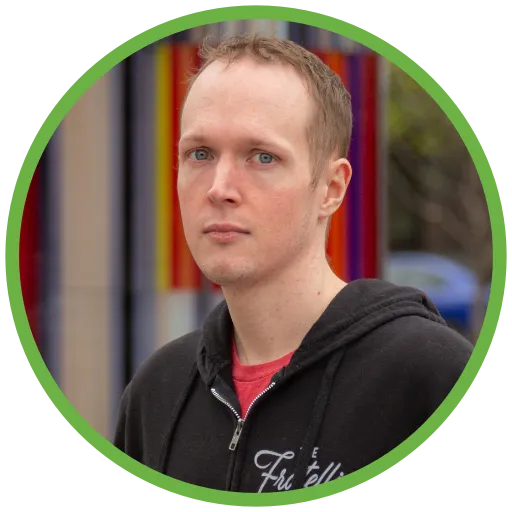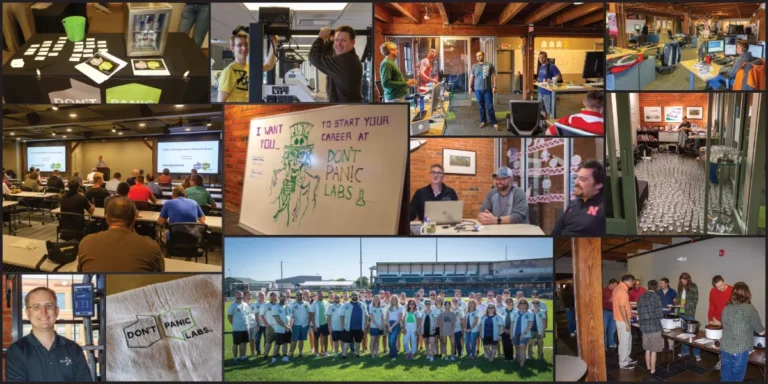
Reflections on Attending the Kansas City Developer Conference (KCDC 2024)
The Kansas City Developer Conference (KCDC) consists of a full day of participatory workshops, two days full of talks, an evening mixer, a whole lot of sponsor booths, some regretful karaoke, great barbeque, great bars, and at least one actual magician. Today, we’re talking about my attendance at the 15th annual KCDC, held June 26th – 28th this year in downtown Kansas City, MO.
Don’t Panic Labs (where I work as a senior engineer and architect) took full advantage of the conference this year by sending a sizeable chunk of our employees to KCDC in a variety of roles to have a variety of experiences. This was easily accomplished as the conference had workshops and talks catering to software developers, architects, UI/UX designers, project managers, business folk, and everybody in between. Our office is located in Lincoln, Nebraska, and though we have developer conferences inside Lincoln and nearby Omaha, we don’t have anything on the same scale as KCDC. So, there was nothing for it but to hop in a handful of cars and drive south a couple hundred miles.
We’ll Workshop It
My goal was to attend a wide breadth of topics from weighty en vogue topics such as “fine-tuning Meta’s Llama LLM” to interactive project management discussions on different approaches to building a backlog. The schedule was posted ahead of time, so I had an agenda of all the workshops and talks I would attend well before the conference began. I believe there’s something to be learned about most things from any source, so I wanted to go around and see what I’d pick up.
Conferences always seem to have a “pre-conference” workshop day to soft-launch the event (for an additional ticket fee) with extended workshops for more in-depth and participatory sessions. The extra expense was minimal, and I was fortunate enough to attend the workshop day this time around, and I thoroughly enjoyed the experience. If you’re looking to attend a conference in the future, don’t overlook the workshop day.
I eased into day 1 of KCDC with a half-day workshop on Roslyn source code generators in C#, given by Drew Frisk. Well, eased in is perhaps not the best phrase to describe this workshop. I find this topic fascinating, and I’d read a little about it previously but couldn’t decide how to proceed. For four hours, Drew walked us through an increasingly complex set of project samples he’d prepared as he explained to us all about how to write code that writes code. He provided great source material and background into his personal experience battling these crazy code generators. I loved going through this, though I’m still wondering about a practical use case that fits into my world.
I eased out of day 1 with another 4-hour workshop. This time, a long discussion on the innumerable range of struggles the users of the things we build have, how we can better empathize as makers, and the steps we can take to provide an inclusive experience for everybody. This was a “focused accessibility” workshop, given by Chris DeMars. This is a topic I always want to improve on, but I wonder about where to begin. Getting started can be daunting, but Chris is great, and his workshop was great. However, I feel obligated to tell you that Chris began the workshop by taking the temperature of the room with regard to who did and who did not believe in ghosts. I couldn’t wait to see how this would factor into the workshop. It did not; he just wanted to know.
Throughout the day, watching these guys give their impassioned talks, it occurred to me that I could always watch videos online, read blogs and books, do tutorials, and whatever other self-study activities, but those would never be a replacement for sitting in a room with an expert and getting direct instruction like this, on the spot correction, immediate answers to questions, and participating in the discourse of the room. There’s something to be said for learning in this type of environment. Moreover, these guys made me wonder what thing I might excitedly teach others about.
Talkie, Talkie, Talkie
I attended many talks over the conference, as you can imagine, and it would be tough to roll everything up into a summary. So, I’ll just provide some rapid-fire mini-reviews to give a sense of the sorts of sessions you can expect to enjoy at KCDC. In order of attendance:
- The Architect’s Playbook (Clint Edmonson). At Don’t Panic Labs, we love to discuss software architecture and we have our own “playbook”, so naturally I had to see what this fellow had in his. There was a good deal of overlap in our playbooks, and I was all too happy to assimilate Clint’s knowledge into our collective.
- Be Your Own SRE: Observability for Developers (Jessica Kerr). This chat from Jessica showed how to use good logging and tracing patterns to diagnose issues in applications. A representative of honeycomb.io, Jessica used that tool in particular for her demonstration. She meant to show us how to track down an intentional bug in her demo, but funnily enough the demo had an unintentional bug, so we watched her use the tools to diagnose that one in real-time.
- Chaos Architecture: Strategic Flexibility in Evolving System Design (Cory Shivers). If you title your talk “Chaos Architecture,” I want to hear what fresh madness you’re talking about. It’s always fun to hear the world described from another architect’s perspective, but this talk was not nearly as chaotic as I had hoped. Cory’s thoughts on evolutionary development are not completely unlike Juval Löwy’s IDesign Method, and indeed Cory gave a shoutout to Juval’s book in his session.
- Example Mapping: The New Three Amigos (Thomas Haver). This one was all about an approach to teasing out user stories and acceptance criteria. You ask questions to produce rules, rules to produce examples, examples to produce acceptance criteria, acceptance criteria to produce tests. Profit.
- Arbitrary code execution, I choose you! (Sarah Young). I went to this delightful session at the close of the second day and learned about video game exploits over the decades (from breaking the original Nintendo’s lockout chip to jailbreaking Nintendo Switches with paper clips). I laughed, I cried, I stayed on the edge of my seat.
- From Experimentation to Implementation; Putting Insights into Practice Without Hesitation (Erin Mikail Staples). This was my first talk on the third and final day. Erin is a morning person, as she reminded the sluggish room a few times at the beginning. After three consecutive nights out in downtown KC, I was decidedly not a morning person, but I enjoyed this session regardless. Erin told us all about her approach to experimentation in products, leaning on the use of her company’s feature-flagging product, LaunchDarkly. I was attending more to hear about the systematic approach to experimentation than I was the tool of choice, but the software seemed handy, nonetheless.
- There and Back Again: A Quality Assurance Tale (Liz Wait). Short and sweet, Liz gave us a heavily Hobbit-reference-laden tale of her journey from QA to developer and back to QA. She discussed the things and, of course, the friends she made along the way.
- The Next Decade of Software Development (Richard Campbell). This was thee talk to be at, apparently, as it was a packed house. Richard, of “.NET Rocks!” fame, gave off Steve Wozniak vibes as he discussed where we are in software development, how we got here, and extrapolating from that, where we are going. Richard’s a great speaker and a lot of fun to listen to.
- The Illustrated Guide to Node.js (David Neal). David doesn’t look like a stereotypical programmer; rather, he looks like he might unironically say, “it ain’t much, but it’s honest work” regarding his daily tasks. I mean that in the best possible way. This session was one former .NET developer’s unapologetic love letter to Node.js. It was wholesome, humorous, and informative, if a little introductory.
- Building Custom Large Language Models with Llama: Exploring Pros and Cons (Min Maung & Lwin Maung). With apologies to Min and Lwin, I had a tough time figuring out the specific goal of this session. They said they had AI write their talk abstract to see if anybody would notice, and I mostly noticed that the talk didn’t jive well with the abstract. All that said, these were fun guys, and they said a lot of interesting stuff about running and fine-tuning LLMs on their own hardware.
Without exception, I took something with me from every session. They weren’t all without their hiccups; some veered off topic or became a bit frenetic at times, but I believe you get what you put into these things, as cliché as that sounds. I thought I’d be able to squeeze in code reviews and keep up with work conversations remotely throughout the conference, but I could not. I didn’t want to “un-focus” (blur?) from conference-mode and devalue the whole experience. Realistically, nobody missed me at the office.
So, Go to a Conference
At this point, I’m certain it goes without saying that I had a great time at KCDC. Not just the conference but checking out a little bit of the food and nightlight in KC with my coworkers, discussing the virtues of the many flavors of Star Trek (typical), talking tech with other booth sponsors, the magician (second mention of a magician without elaboration), and handing out drink tickets for the conference mixer on behalf of Don’t Panic Labs, a Titanium Level™ sponsor of the event. But somewhere in all the glowing praise for KCDC, there must be some valid criticism, right?
Well, a few of the sessions I had planned to go to were full, and at least one had an obviously contagious sick man in it, but there were always good alternatives happening simultaneously, so I couldn’t be too upset about it. And sure, the temperature of some of the session rooms was low enough to safely store slabs of frozen beef, juxtaposed with the sweltering heatwave outside the convention center. I regretted not having a sweatshirt, but there was always enough time between talks to lie on a rock outside and warm in the sun like a common Chuckwalla lizard. I can hardly complain. I’m easy to please.
I think what I’m trying to say is: go to a conference, learn something, give a talk, speak with somebody new, have a good time.
(Bonus) The Quotes
- “I live JavaScript. I’m not ashamed to admit it.” – David Neal, The Illustrated Guide to Node.js
- “I’m talking about real CSS. We don’t use Tailwind in my room.” – Chris DeMars, Rea11y Simple #A11y: A Focused Accessibility Workshop
- “If you don’t assign a designer to your project, you’re going to get [what I call] ‘developer art.” – Clint Edmonson, The Architect’s Notebook
- “The future is here. And it’s NATS.” – Cory Shivers, Chaos Architecture: Strategic Flexibility in Evolving System Design
- “’No complaints’ is not a successful experiment [result].” – Erin Mikail Staples, From Experimentation to Implementation; Putting Insights into Practice without Hesitation
- “You’re a moron.” – Bill Udell said to me during banter at the Don’t Panic Labs booth



